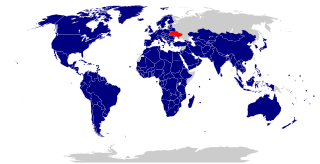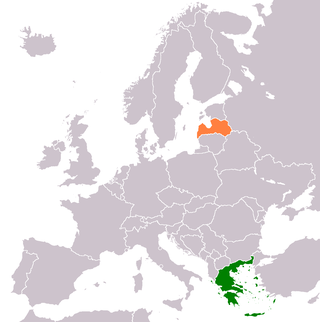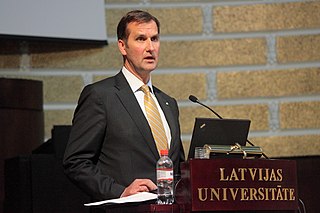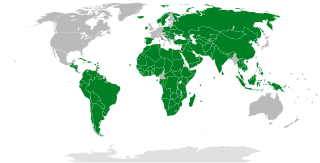This article needs to be updated.(October 2022) |
This article needs to be updated.(October 2022) |
The Republic of Estonia gained its independence from the Russian Empire on 24 February 1918 and established diplomatic relations with many countries via membership of the League of Nations. The forcible incorporation of Estonia into the Soviet Union in 1940 was not generally recognised by the international community and the Estonian diplomatic service continued to operate in some countries. Following the restoration of independence from the Soviet Union, Russia was one of the first nations to re-recognize Estonia's independence. Estonia's immediate priority after regaining its independence was the withdrawal of Russian forces from Estonian territory. In August 1994, this was completed. However, relations with Moscow have remained strained primarily because Russia decided not to ratify the border treaty it had signed with Estonia in 1999.

Foreign relations of Latvia are the primary responsibility of the Ministry of Foreign Affairs. Today's Republic of Latvia regards itself as a continuation of the 1918–1940 republic. After the declaration on the restoration of its full independence on August 21, 1991, Latvia became a member of the United Nations on September 17, 1991, and is a signatory to a number of UN organizations and other international agreements. Latvia welcomes further cooperation and integration with NATO, European Union, OECD and other Western organizations. It also seeks more active participation in UN peacekeeping efforts worldwide.

Ukraine has formal relations with many nations and in recent decades has been establishing diplomatic relations with an expanding circle of nations. The foreign relations of Ukraine are guided by a number of key priorities outlined in the foreign policy of Ukraine.
Iceland took control of its foreign affairs in 1918 when it became a sovereign country, the Kingdom of Iceland, in a personal union with the King of Denmark. As a fully independent state, Iceland could have joined the League of Nations in 1918, but chose not to do so for cost reasons. It negotiated with Denmark to initially carry out most of its foreign relations, while maintaining full control. Denmark appointed a diplomatic envoy (Ambassador) to Iceland in 1919 and Iceland reciprocated in 1920, opening an Embassy in Copenhagen. Iceland established its own Foreign Service in April 1940 when Denmark became occupied by Nazi Germany and ties between the two countries were severed. The Republic of Iceland was founded in 1944. The Icelandic foreign service grew slowly in the post-WWII period, but increased rapidly after the mid-1990s. Iceland's closest relations are with the Nordic states, the European Union and the United States. Iceland has been a member of the United Nations since 1946. Iceland was a founding member of the World Bank in 1946 and NATO in 1949. In terms of European integration, Iceland was a founding member of the OEEC in 1948 and the Nordic Council in 1952, it joined EFTA in 1970, was a founding member of the CSCE in 1973 and the EEA in 1992 and joined Schengen in 1996.

Sandra Kalniete is a Latvian politician, author, diplomat and independence movement leader. She served as Foreign Minister of Latvia 2002–2004 and as European Commissioner for Agriculture, Rural Development and Fisheries in 2004. Since 2009, she has served as Member of the European Parliament (MEP) for the European People's Party.

Greek-Latvian relations are the bilateral relations between Greece and Latvia. Both countries are full members of the Organization for Security and Co-operation in Europe, of NATO and the European Union. The Latvian embassy in Athens was established in 1998. Latvia also has two honorary consulates in Piraeus and in Thessaloniki. The Greek embassy in Riga was opened in January 2005.

Visa requirements for Israeli citizens refers to regulations pertaining to visas for holders of Israeli passports.
Visa requirements for Cameroonian citizens are administrative entry restrictions by the authorities of other states placed on citizens of Cameroon. As of 2 July 2019, Cameroonian citizens had visa-free or visa on arrival access to 46 countries and territories, ranking the Cameroonian passport 96th in terms of travel freedom (tied with passports from Burundi, Congo and Liberia according to the Henley & Partners Passport Index.
Visa requirements for Ivorian citizens are administrative entry restrictions by the authorities of other states placed on citizens of Ivory Coast. As of 2 July 2019, Ivorian citizens had visa-free or visa on arrival access to 56 countries and territories, ranking the Ivorian passport 88th in terms of travel freedom according to the Henley Passport Index.

Visa requirements for Democratic Republic of the Congo citizens are administrative entry restrictions by the authorities of other states placed on citizens of the Democratic Republic of the Congo.

Visa requirements for Latvian citizens are administrative entry restrictions by the authorities of other states placed on citizens of Latvia. As of January 2024, Latvian citizens had visa-free or visa on arrival access to 186 countries and territories, ranking the Latvian passport 9th in terms of travel freedom according to the Henley-on-Thames Passport Index.

Māris Riekstiņš is a Latvian politician and diplomat and a former Foreign Minister of Latvia. He is the former Ambassador of Latvia to the Russian Federation. Currently serves as Permanent Representative of Latvia to NATO.

Edgars Rinkēvičs is a Latvian public official and politician serving as the 11th and current president of Latvia since July 2023. He previously served as the minister of foreign affairs of Latvia from 2011 to 2023, and head of the Chancery of the President of Latvia as state secretary of the Ministry of Defence, as well as a deputy of the Saeima.

As of May 2024, the State of Palestine is recognized as a sovereign state by 145 of the 193 member states of the United Nations. It has been a non-member observer state of the United Nations General Assembly since November 2012.

Bangladesh–Latvia relations refer to the bilateral relations between Bangladesh and Latvia. Bangladesh was one of the first countries to recognize Latvia in 1991. Diplomatic relations between the two countries officially started on 21 January 1993.

Kubanychbek Kasymovich Omuraliev is a Kyrgyz diplomat and ambassador. He is the Secretary-General of the Organization of Turkic States since 2022.